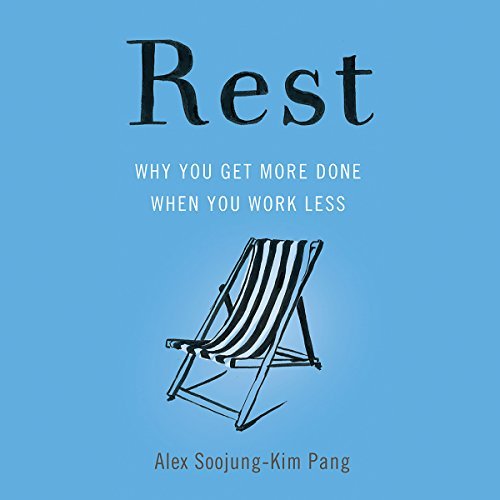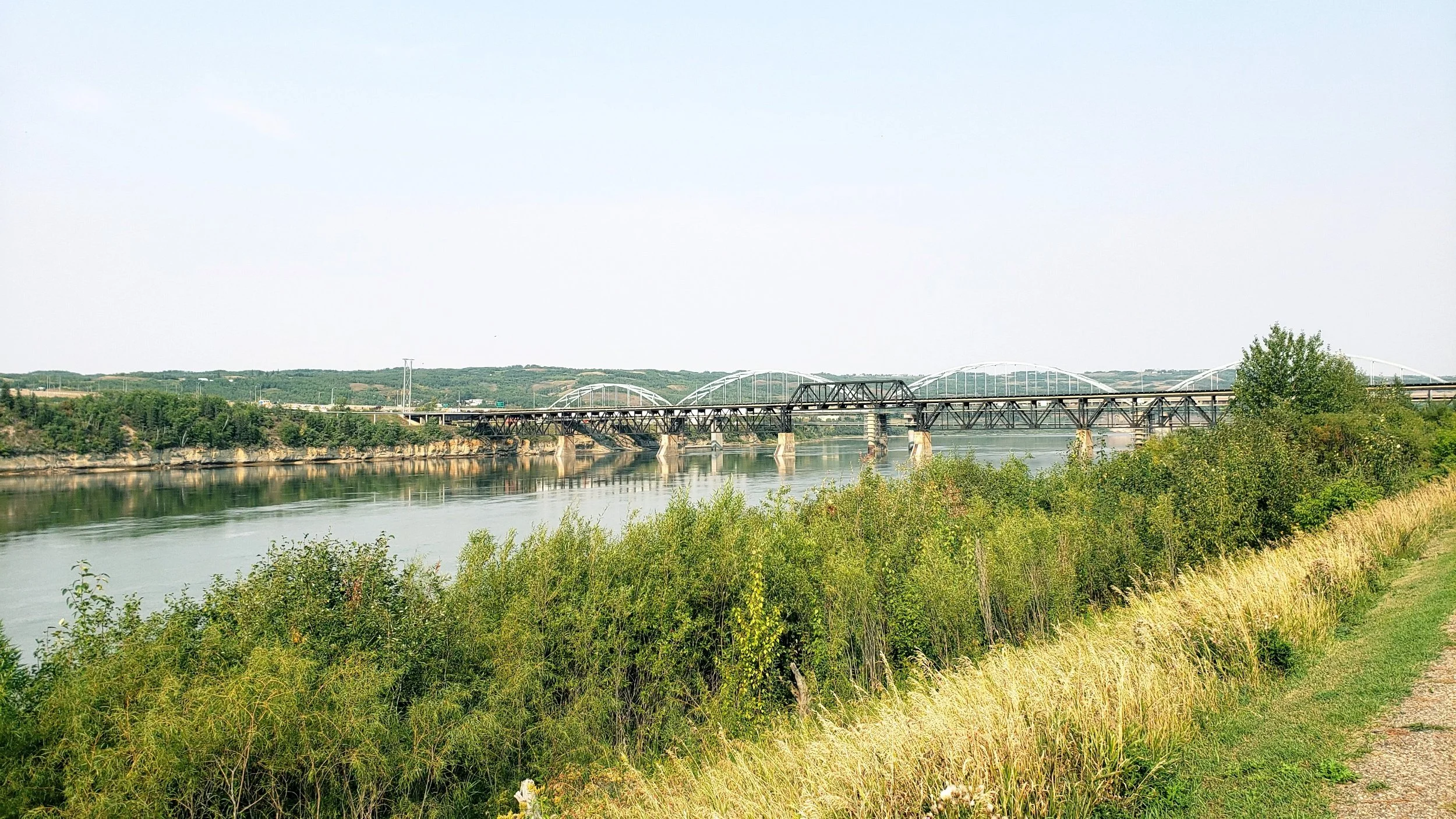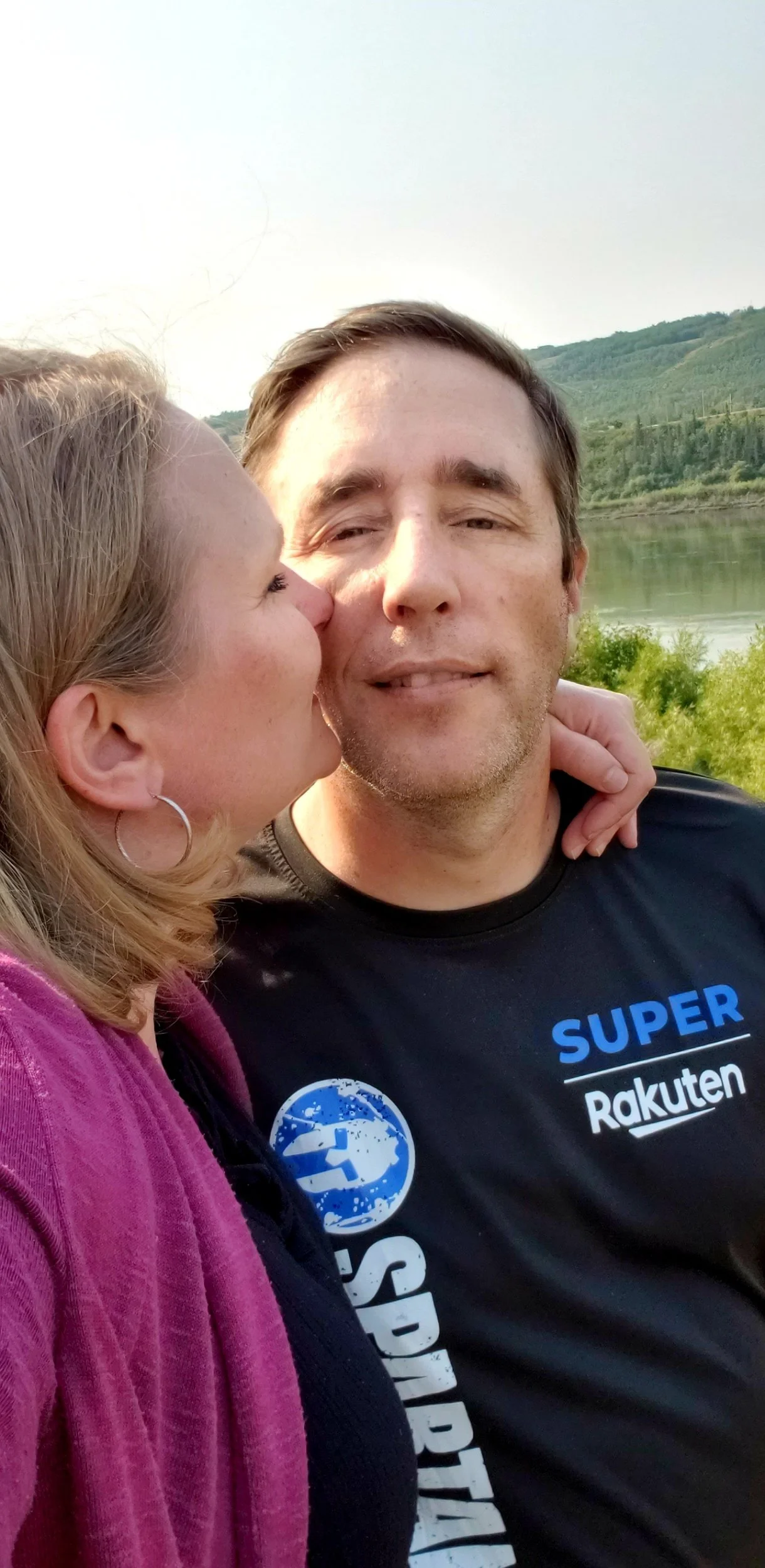Getting Serious about Rest
There’s a certain amount of appropriate irony to the fact that during my Labour Day weekend, I consumed an entire audiobook about rest.
Square blue book cover showing a beach chair. Text: Rest: Why you get more done when you work less* by Alex Soojung-Kim Pang.
On Friday, I got an email newsletter from the Calgary chapter of Editors Canada, in which Rest: Why you get more done when you work less* by Alex Soojung-Kim Pang was listed as their next book club pick.
*I am an affiliate of some of the platforms available through this universal link. That means if you purchase the book from those platforms, I get a few cents at no extra cost to you.
I’d heard of the book before—I don’t remember where. I’d even looked it up. But this time, I was primed for it. When I saw the title in that email, I went straight to Amazon and bought the audiobook.
When the student is ready, the teacher appears, and all that.
I’m glad I got the audiobook. My friend Brenna, who happens to be one of the co-leaders of the Calgary Editors Canada twig, said she found reading the book a bit dry, and I can see why. Mr. Pang uses a lot of studies, facts, and figures to back up his thesis about how the different forms of rest he covers in the book have been regular parts of the lives of some of the most accomplished people in history. Listening to those figures delivered by the narrator breathed some life into them and made it much less dry. Also, it’s easier to stay engaged when you’re listening while doing some other task that doesn’t require much engagement, such as cooking, knitting, or driving.
That’s not to say that I think he overdid it on examples. Not at all. In fact, as I just saw in another reviewer’s headline, “You need all those examples to prove to yourself ‘rest’ is valuable.”
At least, us hardened workaholics do.
I Rested—Honest, I did!
I was raised by a mother who firmly believes in the value of rest. As a Seventh-Day Adventist Christian, she always taught me the value of putting aside one day a week not to work. After all, if God rested on the seventh day, who was I to do otherwise?
For the most part, I’ve honoured this establishment throughout my life—though, for me and my driven self, rest often looked a lot different than the strictures the SDA church put on me as a child. In fact, my sabbaths more often embraced the maxim A change is as good as a rest, filled with creative projects I saved only for that day that allowed me to rejuvenate in ways that simply sitting around not swimming, creating, or doing other forms of forbidden “work” would not. (More on that in a minute.)
Yes, believe it or not, rest has actually been a high priority to me for most of my life. Thank the Lord he gave me both a mother who taught me as much and the conviction to revive the tradition in my early twenties, or I probably would have burned out many more times and a lot sooner than I did.
Lest you get the wrong idea, Seventh-Day Adventists don’t sit around doing nothing on Saturdays. They usually fill their sabbaths with church, potlucks, nature walks, naps, and visiting friends and family, at least in my memory. The older I get, the more appeal these activities hold for me—but, since I’m not a Seventh-Day Adventist and have attended church on Sunday for my whole adult life, I wasn’t embedded in a system or social circle which also embraced these Saturday activities. So, in order to honour the Sabbath and ensure I had a weekly rest, I had to find my own way.
When I was younger and had more energy and my daily work was raising little boys, my sabbath rest often looked like sewing, scrapbooking, and other forms of creative expression that allowed me to make something tangible that would last, as opposed to the continual cycle of cooking, cleaning, and child-rearing, where the benefits were harder to see on a daily basis.** And on Sundays after church, rather than spend the day relaxing, I usually do house and yard work for the rest of the day.
Seven years ago, when I was suddenly torn from the life stage of parenting a young child, I turned to work as a way to both heal and avoid my grief.
That’s when I started into my current cycle of overwork, and working on my career from Sunday night to Friday night with pauses only to eat and sleep became the norm. Soon, I didn’t know who I was without work—what I did had become my entire identity. And despite my strong internal fire for what I do, after seven years, the lustre had begun to dull.
Which is probably why this quote from the introduction of Pang’s book resonated with me so much:
“When your work is yourself, when you cease to work, you cease to exist.”
That sounds extreme, but that’s how I have felt for some time.
A Day Off Isn’t Enough
Thanks to my belief in sabbath rest (which my own body and experiments reinforced time and again), even in my worst workaholic phases, I have always usually taken one day on a weekend to relax—but, with my shift in schedule seven years ago, the way that rest looked shifted from the active rest I had so long embraced to more of an all-out coma a do-nothing day, since I had expended literally all my energy during the week. I had nothing left to give my friends, my family, or myself.
Eventually, I realized this wasn’t good for me or my relationships, and set aside Saturdays as the day I would get together for friends with coffee. No more saying, “No, I can’t, I’m working.” Instead, it became “How about we get together Saturday?” (Fortunately, by then I had trained my circle to understand that working from home doesn’t mean always available. Now I just had to train myself that connecting with those I care about on a Saturday would still energize me, even when I was dog-tired.)
Ever since I hit the pit of burnout in January 2021, I’ve been on a journey to full recovery. And, as writing coach Becca Syme teaches, it’s often not a straight trajectory. Especially once you get to a point where you’re feeling mostly better, you tend to push yourself too hard and it can take super-long to heal the last twenty-five percent because of it. I can attest to that—I think it’s why I was veering so dangerously close to burnout again this year after the major upset to my life system this spring.
But even during my recovery phases of burnout, working days from 8:30 a.m. to 9:30 p.m. with a few hours in the middle for meals were my norm. It was a rare week when I didn’t log less than forty-nine hours of butt-in-chair work time, and sometimes as much as sixty when nearing a deadline. (My massage therapist and I get along great. We should. I see him more often than most of my friends.)
But after returning home from my two months away this spring, with a looming book release deadline and several weeks of reduced capacity due to catching COVID too, I pushed myself harder than I should have, back to working those sixty-plus-hour weeks I knew I shouldn’t, the ones that had sent me into burnout in the first place.
And, at the same time, I was sinking into depression. For the first time in my life, I woke up unexcited for the work I had to do that day. I’ve always loved Monday mornings—until this summer.
Now for a brief aside about why I do this to myself:
I’ve done a lot of work on myself over the years, and especially since I lost my son and began my career as a writer. But this spring, I was introduced to the enneagram, and that tool has revealed some things about myself to me that have woken me up like never before to how my patterns are hurting not only those I love, but myself—and the motivation behind it.
As a type Three on the enneagram, which also sometimes goes by the name of my top Strength on the CliftonStrengths test, Achiever, it’s no surprise that I’m a workaholic. But it was the enneagram that helped me to see why:
I’m driven by expectations.
And no one’s expectations of me are higher than my own.
But more than that, I’m in a constant battle to live up to the expectations of others. Over the years, thanks mostly to my husband’s influence, I’ve started to develop boundaries to keep out some of those expectations that don’t belong to me. Still, thanks to the enneagram work I’m doing, I’m starting to see more and more how often things I do or have done in the past were motivated by an expectation I didn’t even consciously register before I tried to meet it.
And the weight of the expectations I carried has been driving me into the ground.
If you’re not a Three, you may not understand how gut-wrenching it is to admit something like this. My heart is literally constricting in my chest right now. This is tough stuff to face. (If you get into the enneagram, you’ll discover your own shadows to face, and then you’ll get it.)
This summer, as my internal flame sputtered low, I realized these expectations are killing me. But that led me to ask, “What’s the reasonable amount to expect of a human?”
I didn’t have an answer. I literally did not know what a reasonable amount of effort, love, work, time, etc. to expect of myself was.
All I knew was that the line was somewhere below the level I’d expected of myself up until now. But I didn’t know how to find it.
This was the quagmire I was sinking in when I took my stay-cation in mid-August.
Slow Productivity and Rest
Slow productivity is more than a fad I’m trying—it’s the new expectation I’m setting for myself. I literally have to tell myself that I need to achieve a slower rate of productivity—that this is the new expectation—or this thing is never going to work for me. And in doing so, I’m making space in my life to remind myself what a life well-lived looks like. To take time, daily, to refresh and rejuvenate, so that I’m not just a blob in a recliner by Friday night.
The book Rest found me right when I needed affirmation that this was not only healthy for me and my relationships, but was actually the right move for the longevity and success of my career. More than that, it has motivated me to incorporate a few new practices into my day to honour and boost my health and creativity—namely, getting up a little earlier to allow time for exercise and a regular nap before the afternoon’s work. (If it was good enough for J.R.R. Tolkien and Winston Churchill, it’s good enough for me.)
Still, this night owl can hardly believe I willingly got up at six a.m. today with a plan to nap this afternoon. Naps have been something I’ve only ever done when my reserves are so depleted that even coffee won’t keep my eyes open.
But, to be honest, my reserves are pretty depleted, though I’m feeling much better than I was a few weeks ago. That nap this afternoon is already looking pretty good. :-)
Even though it’s only been a week, I’m already seeing the benefits of the new routine I established last Monday, and I’m looking forward to a week from now when six a.m. will seem a little easier to manage. (By the way, this new wake-up time is also partly inspired by the fact that my husband has been getting up by six since starting his new job—I prefer our schedules to match so I can see him in the morning and go to bed around the same time as him at night. Yep, my night owl days are on hiatus, maybe for good.)
Here’s to new expectations—which will now incorporate deliberate rest like never before.
**I now know that achieving things gives me energy. I knew that then, too, but at the time, I used to feel guilty about this use of sabbath time. In Pang’s book, he calls this type of rest Active Rest, a time-honoured way to refresh for active, busy people like me. That change is as good as a rest philosophy has something to it.
View of the Peace River bridge on Saturday morning. I was walking along the dike with Jason. It was pretty hazy with smoke from some forest fires in BC and Jasper.
This is my favourite person to rest and relax with. :-)
How do you refresh and rejuvenate, friend? Did any of this resonate with you? Do you need to be more deliberate about rest? Let me know in the comments.
Happy Tuesday, and happy fall!



